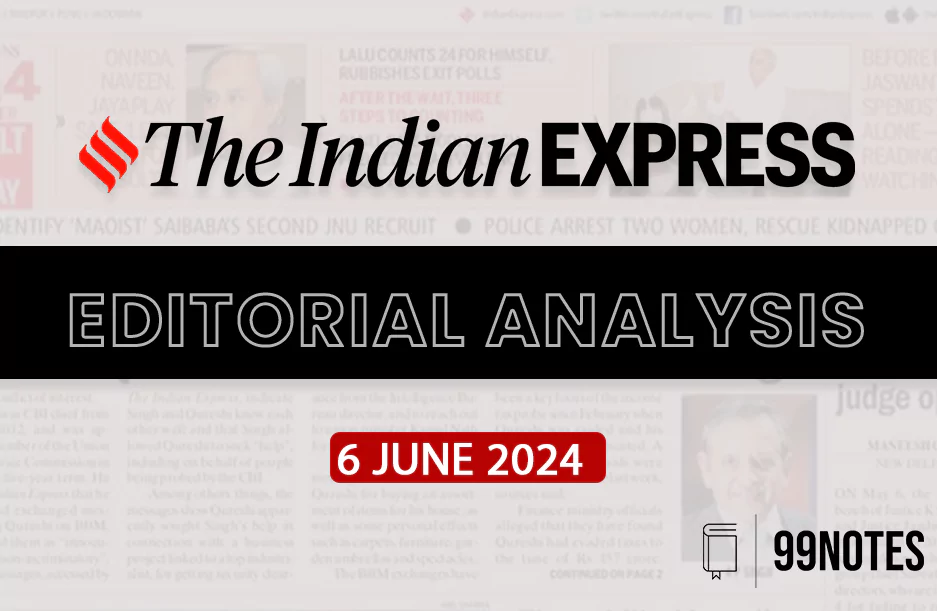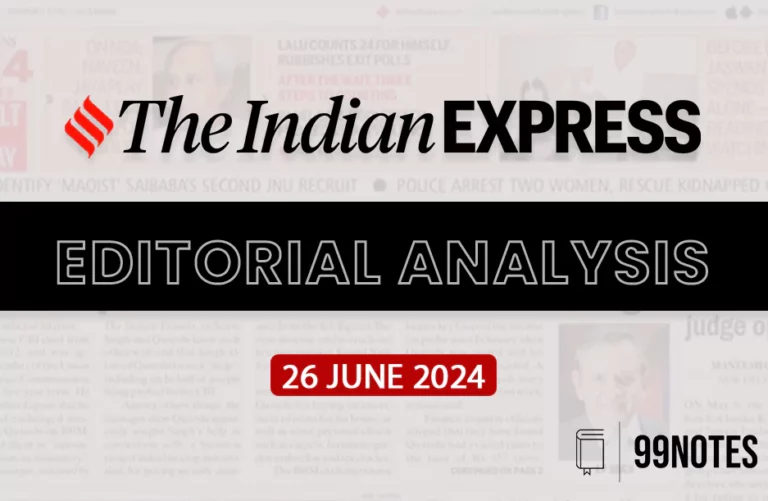6 June 2024 : Indian Express Editorial Analysis
1. At arm’s length, for corporate health
| Topic: GS2 – Governance – Government policies– Interventions for development in various sectors |
| Context: |
|
The article discusses the role and influence of proxy advisors (PAs) in corporate governance, particularly in India, where their recommendations sometimes lead to the rejection of corporate resolutions or spark controversy. It highlights cases like ICICI Securities’ delisting and Tata Motors’ DVR proposal to illustrate how PAs can affect investor decisions. Despite perceptions of their power, PAs primarily serve as support for institutional investors, who conduct their own analyses. The article emphasizes the importance of detailed disclosures and rationales in corporate proposals and addresses the challenges PAs face in maintaining independence and avoiding conflicts of interest. |
Attention on Proxy Advisors:
- Proxy advisors (PAs) often attract attention when their recommendations lead to notable outcomes, such as the rejection of significant resolutions, like Nestlé’s royalty payout, or when there is a divergence of views, as seen in the ITC Hotels demerger.
- However, instances where PAs are united in their views and investors still approve the proposals, with some dissent, such as in ICICI Securities’ delisting and Tata Motors’ DVR proposal, are rare.
Perception of Power:
- A recent article on Jamie Dimon, CEO of JPMorgan Chase, highlighted concerns about the “undue influence of proxy advisors,” creating an impression that PAs wield significant power.
- While this might be true in other countries, it does not appear to be the case in India. For example, Stakeholders Empowerment Services (SES) recommended an “against” vote on 1,841 resolutions in 2023-24, but only 55 resolutions were rejected.
- This indicates that institutional investors in India conduct their own analysis, using PAs as a supplementary resource rather than relying solely on their advice.
Function and Criticism:
- Proxy advisors primarily function as a support system for investors to make informed decisions. Despite their role, PAs often criticize and find faults, which can be likened to a doctor diagnosing issues for corrective action.
- The fundamental problem lies in the interpretation of laws by PAs, which often differ from the companies’ interpretations. PAs set their benchmarks, leading to a situation of “regulatory compliance” versus “governance,” with PAs advocating for governance that goes beyond mere legal compliance.
Valuation Controversies:
- PAs are not valuation experts but have a fiduciary responsibility to raise concerns if a valuation appears unfair. Despite the claim that valuation is an art, discrepancies between valuations can raise doubts.
- SES often conducts independent valuations, considering market prices as the fairest estimation of value.
- Recent controversies, such as those involving Tata Motors and ICICI Securities, highlight issues where a few investors opposed majority-backed proposals due to unmet expectations and not sound arguments.
Specific Cases: ICICI Securities and Tata Motors:
- In the case of ICICI Securities, the opposition stemmed from concerns about valuation based on current prices and the adoption of the National Company Law Tribunal (NCLT) scheme route. The management chose this transparent route, satisfying all PAs and most institutional investors. There is no legal basis to declare a proposal unfair if it meets all legal requirements and does not benefit any individual unfairly.
- The Tata Motors case involved an individual claiming unfair treatment for DVR shareholders, proposing an unrealistic exchange ratio disregarding market price differences. This concept of economic valuation was not grounded in fact. Ultimately, the law remains grounded in reality, unlike speculative arguments.
Evolution and Future of Proxy Advisors:
- Over a decade, the PA industry has matured after initial struggles. The current challenge is to maintain independence, avoid conflicts of interest, and continue operating without concern for outcomes.
- Proxy advisors are not beneficiaries of the outcomes they influence; their role is to support informed decision-making while remaining unbiased and grounded in their assessments.
| Practice Question: Discuss the role and influence of proxy advisors in corporate governance in India, highlighting the challenges they face in maintaining independence and ensuring fair practices. Use recent examples to support your answer. (250 words/15 m) |





